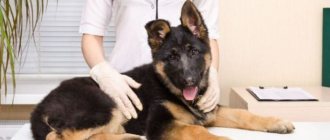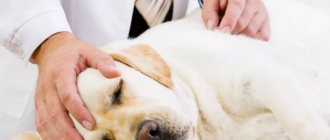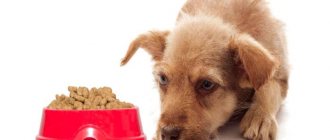Types of wheezing
Depending on the problems, the dog grunts and grunts in different ways:
- dry wheezing usually indicates that the animal is having difficulty breathing. There is a narrowing of the trachea or lumen in the bronchi. This usually happens with bronchitis, or when the dog has swallowed a foreign body. In this case, the exhalation becomes much louder than the inhalation;
- Moist rales are heard when there is a lot of fluid in the lungs. Then the dog can make gurgling sounds through its nose and grunt. Such wheezing is easily distinguishable, even if you do not come close to the animal. The air movement due to the liquid becomes slow, and a characteristic sound appears. This can happen with bronchitis, pneumonia, pulmonary edema;
The dog makes different sounds
- grunting, accompanied by a whistle, appears when the airway becomes too narrow. This can occur, for example, when a foreign object enters the trachea or when the vocal cords are damaged;
- Grunting with shortness of breath, in which the pet appears to be suffocating, can be observed during a heart attack. Then the pet urgently needs medical attention.
Important! It is not always possible to immediately understand why a dog began to grunt. To make sure that this is not a symptom of a dangerous disease, you need to contact your veterinarian. He examines the pet to see if there is a foreign body in its nasopharynx, listens to breathing and, after listening to the owner’s story, makes a diagnosis.
Physiological causes of noisy nasal breathing
If a baby makes grunting sounds when breathing through the nose, this may be because the newborn's nasopharynx and nose are much narrower and shorter than those of older children. Also in the first days of life, the mucous membranes adapt to new conditions. To cleanse the inhaled air, there is mucus in the baby's nose, which causes noise when breathing.
Imperfection of the infant's respiratory system
The nasal septums of newborns, unlike adults, have mobility. This physiological feature often causes the appearance of extraneous sounds when inhaling. As a rule, after just a few months, the nasal septum becomes stronger, and breathing noise gradually disappears.
When teething, the baby has a low-grade fever, salivation increases, and snot appears. A large amount of mucus in the nasopharynx creates an obstruction to the inhaled air, which leads to the appearance of grunting sounds. After the tooth cuts through the gum, the child’s well-being returns to normal, and breathing becomes silent.
The accumulation of thick mucus in the respiratory organs of infants occurs due to the fact that they spend a lot of time lying on their backs. This makes it difficult for mucus to flow out, and it accumulates in the baby’s nasopharynx. When mucus is thin, it flows down the nasal passages more easily. Viscous muconasal secretion lingers in the nasal cavity and causes discomfort in the child.
The mucus in the baby's nasopharynx thickens under the influence of the following factors:
Drying of the nasal mucosa
When a baby grunts through his nose, but there is no snot, a possible cause of extraneous sounds may be drying out of the mucous membranes in the nasal cavity. The crusts that appear in this case make it difficult for the baby to breathe, especially during sleep. The cause of drying out may be dry or polluted air in the room where the child stays for a long time.
In order not to encounter such a problem, parents should constantly monitor the cleanliness of the apartment, periodically ventilate the room, and walk in the fresh air every day. To humidify the air in the room, especially during the heating season, you can use special devices or hang wet towels near the radiators.
Getting milk or formula into the nasopharynx is the cause of grunting during feeding
The reason for the grunting of a month-old baby may be that formula or breast milk gets into his nasopharynx. Babies also grunt when burping. In order for the baby to breathe well when feeding, you need to hold him in such a position that his head is higher than his body.
Natural predisposition of some breeds
There are dog breeds that grunt due to their structure. These dogs have a short, or as it is often called, flattened muzzle. Among them are a pug, a Pomeranian, a chihuahua, a sharpei, a bulldog, a mastiff, a Pekingese, and a Yorkie.
The dog is coughing as if choking: why and what to do
Their nasal cavity is small, and the air entering through the nostrils does not have time to cool, so the dog sniffles and makes grunting sounds. The structure of the nasopharynx leads to the fact that hot air immediately goes into the lungs, which provokes heat strokes. Such animals need to be monitored and periodically shown to veterinarians.
Note! Doctors say that nothing needs to be done if a dog with a short muzzle snores and grunts. Usually people quickly get used to such sounds. But this does not negate the need to periodically show the animal to specialists to rule out health problems.
Difficulties may arise in hot weather. Pets with short muzzles do not tolerate stuffiness and the scorching sun. They may even choke on their own drool and begin to choke. Therefore, you need to be especially attentive to them when walking during the summer afternoon sun and on long trips.
How to help your baby?
Therapeutic measures for nasal congestion in infants should consist of eliminating the causes that caused the runny nose. An important role in treatment is played by the atmosphere in the room in which he spends most of his time. It is necessary to carry out wet cleaning daily, ventilate the room and, if necessary, humidify the air.
Proper hygiene
Nasal congestion in a baby can lead to more serious consequences.
If timely measures are not taken when the child sniffles and grunts, parents may encounter allergic reactions and infectious diseases. If your baby has a stuffy nose, but no snot flows, most likely the reasons for this condition are physiological. To alleviate the baby’s condition, it is enough to maintain nasal hygiene. To do this, you should clean the nostrils one by one with cotton swabs, and if this is not enough, rinse.
Creating optimal conditions in the nursery
Dr. Komarovsky believes that if a child constantly has a stuffy nose and grunts when inhaling air, the parents’ first priority is to create optimal conditions in the children’s room for the baby’s health. The air temperature in the room should be about 21 ° C, and the humidity should not exceed 70%. If the air in the room is too dry, you need to use a humidifier.
Komarovsky also advises increasing the time spent with the child in the fresh air. Long walks promote natural hydration of the mucous membranes of the nasal cavity.
Consultation with an ENT doctor
Many young parents have a question about what to do when the baby makes grunting sounds through his nose or throat. The first step is to show the baby to a pediatrician, who, if necessary, will give a referral to see an ENT doctor.
If it turns out that the cause is not the physiological characteristics of the baby, but a bacteriological or viral infection, the doctor will prescribe appropriate treatment. It is better not to treat the baby yourself, as this can lead to irreversible consequences.
Source
Mechanical damage and foreign bodies
Outside, while exploring the surrounding area, the dog may inhale something, such as a piece of paper or a small stone. An unknown object can damage the mucous membrane, which will cause, at a minimum, discomfort for the dog.
The cat is coughing: why it wheezes, the reasons, as if it was choking
The following symptoms are possible:
- the animal begins to breathe through its mouth and keeps it constantly open;
- the dog begins to cough in fits and starts, as if he is trying to burp something;
- the dog constantly sniffs and touches it with its paws;
- blood appears in saliva.
The animal may also refuse food and food. Foam sometimes comes out of the nose.
If grunting sounds appeared precisely after a walk, then a foreign body is the first thing to think about when looking for the cause of the ailment.
Important! You should not try to remove the object yourself; you can push it deeper, which will cause breathing problems or may scratch the mucous membrane. It is better to trust the professionals and take the animal to the veterinary clinic.
Dog at the vet
Main causes of difficulty breathing
A dog grunts for several reasons. Sometimes this does not cause problems and does not affect the pet’s quality of life. Often, a similar symptom appears during allergic reactions. At the same time, the animal’s eyes water, they may turn red, the dog sneezes and grunts. This is how he may react to the bites of certain insects or to changes in diet. In some cases, breathing difficulties are a symptom of dangerous diseases.
Reverse sneezing
Why is the kitten shaking as if he is cold?
Reverse sneezing usually occurs in dogs with a shortened muzzle. This is one of the characteristics of breeds that is associated with spasms of the tissues of the soft palate.
Note! Veterinarians say that there is no need to panic in such cases, especially if the attack lasts only a few seconds, and after that the dog returns to normal life.
To help the animal come to its senses, you need to remember simple rules that will relieve the attack:
- you need to gently rub your nose;
- Slowly and gently massage the surface of the throat.
After the attack is over, you need to give your pet warm water.
The dog drinks water
Tracheal collapse
When the trachea collapses, it undergoes a sharp and severe narrowing. It may be that there is practically no gap left, and the animal will begin to suffocate. Before this, it will wheeze, grunt and make sounds reminiscent of quacking. Do not hesitate to contact a doctor; your dog may need to be intubated by inserting a tube into the trachea. Sometimes this is the only way to improve breathing and save your pet’s life. Only specialists can provide emergency assistance.
Important! In any case, if the animal breathes only through its mouth and wheezes, and its mucous membranes have turned blue, there is no need to hesitate. The dog may fall into a coma, and even if he is saved, this episode will affect his health in the future.
Paroxysmal breathing
Paroxysmal, or reverse, breathing is observed exclusively in male dogs. An attack when a dog wheezes, grunts and seems to be suffocating, frightens the owners, because strange sounds are not the only thing that changes in the animal’s behavior:
- the dog spreads its paws wide and at the same time strongly arches its back;
- his muzzle takes on a terrifying expression, his eyes turn red;
- he begins to vigorously shake his head from side to side, so that drool flies everywhere.
This condition is dangerous because the dog inhales the air forcefully, it irritates the palate and this can provoke vomiting. At this time, the animal grunts, drawing the contents of the oral cavity back. This can cause vomit to enter the lungs, leading to pneumonia.
Parasite infestation
Worms live not only in the intestines; some species prefer to settle in the lungs. They cling to the walls, injuring the mucous membrane, destroying the bronchi. After the parasites begin their activity, they secrete substances that damage tissue. As a result, the animal begins to cough. This further irritates the organ mucosa, and the condition worsens. The dog is breathing with difficulty, gurgling and grunting can be heard.
Note! If you do not get rid of parasites, they can lead to poisoning of the body. If left untreated, your pet may suffocate.
Heart problems
A dog that grunts may be suffering from heart failure. This is usually typical for older animals. They are constantly thirsty and walk around with their tongue hanging out, which looks quite pale. The animal's gait changes; it reflexively spreads its paws wide. Often the dog is tormented by a cough, the attacks of which are quite long.
The dog is coughing
During a heart attack, your dog doesn't just breathe heavily, he begins to wheeze. In this condition, she must be quickly taken to the clinic.
Pulmonary edema
Pulmonary edema can be caused by infectious diseases, as well as heart failure. At the same time, the dog makes sounds that are unusual for it, wheezes, and has shortness of breath. The tongue and gums become noticeably pale, and the animal is bothered by a dry cough.
Important! Until the dog receives help from specialists, you need to monitor his breathing and remove drool so that he does not choke.
Tumors
When a tumor occurs in the nose, the following symptoms appear:
- grunting develops into a cough, which develops gradually, intensifies and does not go away;
- the animal becomes lethargic, inactive, loses its appetite, and loses weight;
- I'm worried about a runny nose, traces of blood are found in the discharge.
The presence of such signs requires contacting an animal medical clinic.
Reasons why a dog is choking
One of the indicators of the health of a furry family pet is calm and even breathing. And if a dog is choking, then this is an alarming symptom. Physiological changes may be associated with jogging, the animal being in the heat, or in a too stuffy room. The pet may have difficulty breathing and wheezing in its sleep, as well as before and during childbirth.
Such situations, as a rule, do not cause concern among household members. Snorting in dogs of brachycephalic breeds is considered normal due to the specific structure of the nasopharynx.
If you choked
The owner should be alerted to cases when breathing problems occur suddenly. Veterinary experts recommend paying attention to the following reasons why a dog is choking:
- A foreign object has entered the breathing tube . Curious and ubiquitous by nature, pets often inhale small parts from children's construction sets, sewing supplies (threads, buttons) and other small objects into their nasopharynx.
- During a walk, large plant seeds can get into the nose of an active pet.
- An equally dangerous situation is laryngeal edema . An acute condition can occur as a result of a severe allergic reaction, such as to a medication or an insect bite. Swelling of the larynx is often observed in infectious diseases due to the action of toxins on the mucous membrane.
We recommend reading about why a dog chokes. From the article you will learn about why a dog chokes on saliva after barking, after wet food, when drinking water and other situations.
Find out more about the symptoms and treatment of asthma in dogs here.
If she does this periodically
If the owner notices that the dog is periodically choking, the reasons for this situation, according to veterinarians, may be:
- Heart problems. Myocardial defect, the development of cardiovascular failure is accompanied not only by heavy breathing, but also by a decrease in the animal’s physical activity, and bluing of the mucous membranes during an exacerbation. As a rule, symptoms are observed after jogging, active play, or physical activity. 20-30 minutes after exercise, the animal’s condition returns to normal and breathing is restored.
- Parasitic diseases. Roundworms, such as Heartworm and Dirofilaria immitis, can often live in the heart muscle and pulmonary arteries of the myocardium in dogs. Pets become infected with heartworm disease through the bite of an infected mosquito. Cardiac nematodes that enter the body impede blood flow and cause cardiovascular failure in the pet, including breathing problems.
If attacks
The reason why a dog is choking and having seizures may be:
- Stress . Owners of four-legged family members often notice that a malfunction of the respiratory system occurs in a situation where the animal is worried or experiencing a strong emotional state (an unfamiliar place, public transport, a visit to a veterinary clinic, etc.).
- Hydrothorax . The accumulation of fluid in the chest cavity impedes normal respiratory function, causing the dog to choke and cough. The situation requires a serious examination to identify the causes of transudate effusion into the pleural cavity.
- The cause of breathing failure may be a chest injury . This situation is often observed in active pets and hunting dogs, when the animal encounters an obstacle with its chest in pursuit of a relative, cat or prey.
- Attacks of coughing and shortness of breath can be caused by the formation of polyps and neoplasms in the nasopharynx.
- Pain in the abdominal cavity, acute expansion of the stomach with gases are another cause of paroxysmal shortness of breath in dogs.
The dog gets an x-ray
If you wheeze or cough
Common causes of respiratory dysfunction in pets are colds and infectious diseases. Pet hypothermia, bronchitis, and pneumonia are often accompanied by changes in breathing. Infectious diseases of the respiratory system, for example viral rhinotracheitis, parainfluenza, are also accompanied by cough, shortness of breath, and wheezing.
Watch this video about why dogs pant, snore and grunt:
When to contact a veterinarian
A veterinarian's consultation is always necessary if the dog seems to be choking and grunting. Perhaps the cause will be harmless and treatment will not be needed, but it is better to play it safe to avoid complications.
You need to consult a doctor in the following cases:
- the dog’s condition worsens, it becomes lethargic, refuses to eat, and loses weight;
- the dog has an intensified cough that he cannot cope with;
- the animal’s mucous membrane takes on a plum tint, its breathing is difficult, and shortness of breath is noticeable;
- The pet developed snot and a fever.
Only a veterinarian will tell you what to do if the dog snores, grunts and gasps, so as not to harm it. If you have doubts and unfamiliar sounds appear more and more often, do not postpone your visit to the clinic.
If your dog starts to grunt, you should never panic. When this happens once, and the dog’s well-being and mood do not change, there is no reason to worry. If the pet is choking, then he needs the help of a veterinarian. Before it is provided, it is necessary to monitor the pet, easing its condition, and controlling its breathing.
A runny nose in a dog as a cause of wheezing
As soon as you notice your pet's first wheezing or sniffling, you can simply remember how he was feeling up to that point. There is a chance that she is beginning to develop a bacterial rhinitis. In this case, before “grunting” the dog, refer to its condition, become familiar with the appearance of liquid nasal discharge. The reason behind this will require a real need to address the problem to a veterinarian.
A dog's runny nose can cause grunting
Attention! Any manifestation of a runny nose, especially a viral one, is considered a rather dangerous sign that can develop into major complications.
The following grunting situations are quite common:
A viral runny nose can lead to serious consequences
True, we should not discount the more sophisticated causes of dog snoring.











